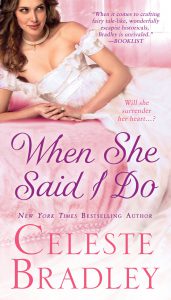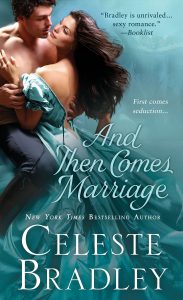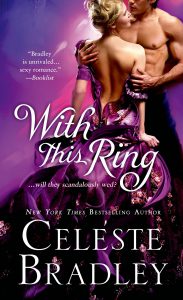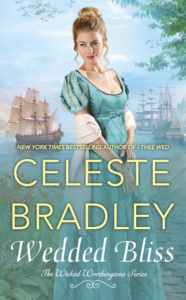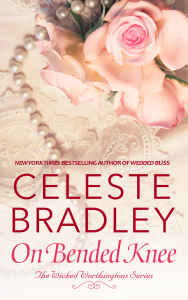Lysander Worthington has existed in a dark place since he came back from the war. His heart seems like a locked chamber, hidden even from his beloved family. Life seems like a constant battlefield. When Lysander encounters an enraged farm animal in a remote Yorkshire village, his battle instincts take over!
Isolated doctor’s widow, Gemma Oakes, has a habit of taking in the bent and the broken. When a handsome stranger rides into her village and proceeds to destroy their festival, Gemma believes she can help this beautiful, damaged man cleanse his heart of war.
Lysander’s darkness appeals to Gemma’s nurturing spirit, while his beautiful body mesmerizes her senses. Lysander has kept his secret for so many years, but Gemma’s inner strength and open heart tempt him to speak at last. Among the beloved, misfit inhabitants (not all human!) of Yew Manor, can Lysander and Gemma trust enough to understand broken hearts can mend, and shattered souls love again?
If you’ve perused the earlier books in the Wicked Worthingtons series, you’ll recall that Lysander Worthington is a shadow of a man, a dark presence in the cheerful Worthington household. The war has set him apart from his loving family and he doesn’t know how to reach out to them. To write this book, I had to balance the usual lighthearted Worthington humor and hijinks with an earnest look at traumatic damage.
As a storyteller, I hope I’ve both delivered an entertaining and romantic (and sexy!) story and also have done justice to the difficult and tragic effects of PTSD. I learned so much while looking into this devastating disorder. This is a thing that can happen to any of us, at any time in our lives, not just a distant ordeal that happens to soldiers in far away lands. Blessed healing to any heart and mind suffering in such a dark place.
ON BENDED KNEE
Chapter 1
IF THE DEVIL KEPT sheep — and Lysander Worthington, of the London Worthingtons, had no reason to suppose that the devil didn’t keep a fiendish herd in some fiery version of the Yorkshire Dales — then the devil would have had Lysander’s adversary as his personal pet ram. The creature had surely come straight from hell.
I was only riding through. Just through the blasted village and out again.
It wasn’t simply the eerie narrow iris of the ram’s eye. All sheep had a similar gaze and Lysander had met a few perfectly angelic woolly creatures in his thirty-one years. It wasn’t the ram’s multicolored face, splotched with black and white in a highwayman’s larcenous mask. Lysander’s own mount, his brother’s fine riding horse Icarus, had a striking white blaze down his nose, and Icarus was as well behaved as any slightly nervy thoroughbred could be.
Perhaps it was the creature’s curling horns that twisted a bit wrong, spiraling straight out from each side of its hellish head like armored corkscrews. The cruel projections had clearly been waxed to a fine shine by the ram’s attentive owner. Lysander had a light-headed vision of a scarlet-skinned devil, cooing fondly at his straggle-woolen pet whilst stropping the beast’s horns with a polishing cloth.
No matter from where the truculent creature had come, it clearly believed itself the rightful master of this otherwise unremarkable village common. The beast stood stiff-legged and twitchy, aggressively challenging Lysander and his borrowed mount, Icarus. The maddened gaze heated. The hell-spawn ram scraped a cloven hoof on the scattered straw in warning. Apparently the fluffy fiend took offense to Icarus’s elegant long-legged form, which surely looked quite strange to its tiny mind after a lifetime of thick, stolid draft horses and plow ponies.
Aristocratic Icarus, on the other hand, visibly trembled in terror before the snorting demonic creature bountifully festooned in multicolored festival day ribbons, which twisted and flapped in the afternoon breeze in ludicrous counterpoint to the lethal twisting horns.
Lysander had a single instant to wonder if Icarus, London creature that he was, had ever actually seen a sheep.
The previously amiable horse let out a shrill neigh of panic and performed a gyrating, rearing hop that not only faced the gelding away from the rage-maddened ram, but also aided in putting a nearly instant quarter mile between himself and the nightmarish creature.
Unfortunately, Lysander was not invited on this retreat. The world flipped on its axis and he found himself facedown in the mud with the wind knocked clean from his lungs. Shaken by the fall and his sudden change in stature, he madly scraped the mud from his face and eyes and drew his breath in with a strangled gasp.
Mud. Mud and blood and pain. Thunder.
In time, he would look back to comprehend that the pounding that shook the earth was merely the retreating hoof beats of the fleeing Icarus. Unhappily, in that moment Lysander instead heard the thunder of cannon and storm.
And any moment icy rain would pour from the war-blackened sky and the earth would run with blood.
His heartbeat sped until he could hear nothing but the hammer of his own pulse and the hoarse gasps of his own breath scraping its way out of his throat. There was no village festival, no shattered prize sheep’s pen, no gaping crowd of astonished Swaledale farmers around him. There was only the rocky fist of memory, knocking him heedlessly backward in time, flinging him down on a mud-and-blood spattered field of war in Spain.
Thunder. Cannon. Enemy. Battle.
The ram lowered its head and gave a threatening snort, taking up the challenge with vicious glee. Battle indeed, it seemed to say.
To the death, if necessary.
EARLIER THAT DAY …
LYSANDER WORTHINGTON HAD BEEN in the saddle for two days –– or was it three? Not that he cared terribly. On horseback, it was much less necessary to speak to anyone. There were a few people on the road and if he timed the pace of his mount correctly he could either fall back or pass ahead of any other rider or cart with no more than a quick jerk of his head and a tug on the brim of his hat. He tried to remember manners, although it was much easier for him when he didn’t actually need to use them very often.
Beneath him, Icarus moved with contented grace and far more style than Lysander deserved. Then again, Icarus wasn’t actually his horse. The fine mount belonged to Lysander’s older brother, Dade. “Daedalus and Icarus” sounded much more imposing than “Dade and Icky”, but that’s what everyone in the family called them.
Lysander knew that Icarus was a very good horse. He’d loved horses once, been entirely mad for them, in fact. He remembered that feeling. To be more precise, he remembered that he’d once had such a feeling. Feelings themselves had become a bit distant to him now. He was a man groping in the dark when trying to reach for his emotions of the past.
With the ease of great practice he allowed his mind to slide sideways, away from consideration of the changes that the war had wrought in him. That was the best thing about riding alone for days. With no members of his raucous, beloved, unbearable family around him he could pretend for a few miles at a time that he was just a man on a horse riding down a road.
Occasionally, however, the road became too heavily traveled for Lysander’s comfort. It must be market day, for he was beginning to pass more laden carts and wagons full of expectant families. One cart driver kept pace with Lysander for half a mile, telling Lysander more than anyone ever needed to know about his success growing early greens and the high price he planned to ask for them.
When a fork to the right came along, Lysander took it immediately. The instant relief was so great that he made it a practice whenever the road became too full of people and voices and questions and greetings. As long as he continued to travel north, he would arrive in Scotland eventually. Just to ensure he was not putting himself too far behind schedule, he took to running Icarus at a gallop on every long stretch of empty road. Icarus was all for it, for the great thoroughbred loved nothing better than to run as fast as possible.
This worked reasonably well for most of the morning until Icarus threw a shoe. Lysander dismounted immediately and checking the gleaming black hooves of his mount, discovered that Icarus was unharmed. Lysander pocketed the shoe, for surely there would be a blacksmith somewhere ahead.
There was no point in regret. After all, when one has made such vast and monumental mistakes as Lysander had in the past, running his mount out of a shoe seemed rather minor. Finding a proper smithy would be good, but with the undamaged horseshoe in his pocket Lysander thought he might be able to make do with a barn and some tools. It was his own fault, but speaking to people and possibly asking them for help would be a heavy penance.
He followed the road he was on, the peaceful country lane snaking its way through a verdant valley following the banks of a picturesque river. Looking about him, Lysander noticed for the first time that he had reached the Yorkshire Dales proper. He’d never been there before and he found the quiet walk next to the cheerfully burbling river to be extremely soothing. One never found silence like this in London.
It was almost a shock when Lysander turned a bend in the river and found an active village square before him. It seemed a hardworking but not terribly prosperous village for such a large population. Then Lysander realized that despite his best efforts, he’d walked right into some sort of local festival.
Several giggling children ran past him as they played a game of snatching streaming ribbons from each other’s grip. Icarus startled violently at the shrill shrieking and the wildly fluttering ribbons, so Lysander thought it best to get back into the saddle. He could better keep control of Icarus and afford himself some relief from walking among the crowd. And it was a useful vantage, for Lysander spotted the smithy immediately. He and Icarus headed for a stone building with an open shed to one side where Lysander could clearly see an anvil. The cheerful crowd parted respectfully before them.
Nearly twitching with discomfort, Lysander looked anywhere, everywhere except down at the faces upturned to eye him curiously. Something caught his eye, a graceful movement on the edge of his perception. He found his attention snared by a slim form on the far edge of the crowd.
There was a sort of pavilion set up on the common. It was an unlovely structure that served the very practical purpose of protecting the festivalgoers from sun or weather. Lysander had a vague impression of a giant parasol cobbled together from old carts, the posts looking like wagon tongues, taken from between the horses and plunked upright. The thing was little more than a rickety freestanding roof with no walls. The patchy, hand-hewn shingles had lain in place long enough to acquire a green mossy growth on the northern slope.
He’d caught the woman in the act of brushing away a strand of dark hair from her face. It caught on her lower lip, the brunette lock pointing a perceptible arrow at the soft plump curve of her mouth. She stood on tiptoe, bracing one hand against the pavilion post to gaze out over a number of temporary livestock pens. Lysander wasn’t sure what made him think that she was sad, for her lovely ivory features held a small smile and her gray eyes snapped with lively intelligence. Yet he had the instant conviction that she was all alone in the crowd, separate somehow, watching but not belonging.
What should he do?
Lysander’s twin brothers, Castor and Pollux, would have sent her a flirtatious smile or swept a courtly bow. Yes, it could be done from the saddle. Archie had insisted that they all practice it until Iris approved the romantic gesture.
It would have been a strange education, if one was not a Worthington.
A part of Lysander’s mind, a very quiet, small part, the part that remembered the way life had once been, applauded the notion. Lysander had no idea what he should do. Never once had a pretty woman snared his attention since his return from the battlefield.
That distraction turned out to be hazardous.
Without Lysander quite realizing it, well-trained Icarus had angled his walk in the direction of Lysander’s focus. As they came near, Icarus snorted in spoiled equine offense at the heavy odor of lanolin and sheep dung. Lysander noticed distantly that they had come quite close to the livestock pens, but since he was still generally en route to the smithy he didn’t bother to turn Icarus aside.
Their path had brought them closer to the fascinating lady beneath the pavilion, although she still had eyes for something few yards farther on. Lysander managed to tear his locked gaze from the gray shadows in her eyes to follow the direction of her attention.
He saw that she was watching a farm family. There was a great strapping father, an astonishingly pregnant mother and four clean-as-a-whistle youngsters whose white-blonde heads formed a stair-step of their ages, right down to the smallest boy, who looked to be barely walking. They were all glowing proudly at the tallest child, a skinny girl of perhaps ten years, who wore a smile so wide it threatened to divide her face. Her straw-colored hair was done up in bows and her flowered muslin dress seemed quite at odds with the substantial black and white piglet squirming in her arms.
The family looked on with pleasure as another, even more massive fellow tied a bright blue ribbon around the piglet’s neck and finished it with a delicate bow, which was astonishing considering the thickness of his fingers.
Lysander surmised that he’d spotted the blacksmith. It was obvious from the girth of his forearms and the ruddy features weathered by fire and steam. Lysander sent one last glance toward the pavilion. The lady was gone. Lysander’s visceral awareness of the lady bloomed in the fog of his consciousness, strange and unlikely and not at all welcome. He’d fought so hard for some tiny fragment of equilibrium. Now she had disappeared and he fought a ridiculous sense of loss.
It would be a very good idea to leave this hamlet as soon as possible.
The smith, luckily, was still within reach. Having awarded the winner of the Fat Piglet Competition, the man had clapped the proud papa on the shoulder and begun to walk away.
In his haste to have the horseshoe replaced so he could be gone from this hamlet and back on the road alone, Lysander nudged his heels into Icarus with more force than necessary. Obediently, Icarus shot forward. His great shoulder impacted the corner post of the woven willow livestock pen.
Apparently this had been a most important post in the scheme of things. Once that went down, the entire arrangement of posts and basket-weave fencing came apart like the unraveling of a poorly knit glove.
Startled by the crashing fence parts, the livestock within scurried and bolted in all directions. Squealing pigs ran beneath Icarus’s legs. Ewes and lambs flowed around them like a white river around a black rock. It was all too much for the finely bred horse. He was a civilized creature, accustomed to cobblestones and rubbish bins and ladies with fluttering skirts and cursing cart drivers and newsboys waving gossip sheets. All of that was familiar and sane, while this scurrying, trampling, baaing horde was peculiar and alarming. Icarus reared on his back legs as if he couldn’t bear to have the woolly bodies brush against his hocks anymore.
Lysander clung on as Icarus rose and remained high like a rook on a chessboard poised for his next move. The horde of smelly fleecy offenders trickled to the odd dashing lamb and Icarus let his hooves fall to the ground with a relieved thud.
Movement caught Lysander’s eye as an enormous horned beast abruptly focused his upset on Icarus –– and by default, upon Lysander.
MRS. GEMMA OAKES PICKED herself up off the trampled grass of the common with the help of a few residents of the village of Farby.
“Thank you, gentlemen. No, no. I’ll be fine.” The act of dusting off her skirts belied that statement when a mere twist of her wrist sent a nauseating stab of pain through her.
Gemma, being Gemma, paused and immediately began running through the appropriate treatment of sprains in her mind. She had no cool water to soak in, nor salts, nor even strips to bind and support the joint. Resolving upon the one thing she could do, which was to raise her wrist above her heart to diminish swelling, she cradled her right hand high on her left shoulder and supported the entire arm with her other hand. She imagined she looked as though she were scratching her own back. Then she put all that consideration aside and moved forward to inspect the wreckage.
Someone had come riding into the village and in a matter of seconds had devastated the entire preparations for today’s festival, including Gemma’s special project, Farby’s first country dance assembly. Despite that, Gemma’s first concern was for the man who lay injured beneath the shattered remains of the village’s old pavilion.
And the ram, of course. “Is Shepherd Orren’s ram all right?” She looked to the nearest farmer. “He took no injury?”
“Oh aye, Missus. ‘e’s right as rain, no doubt. No thanks to that big off-comed ‘un.”
That meant “stranger.” Just ahead of Gemma, two of the younger men struggled with a piece of shingled roofing, which they heaved away with timed grunting.
“There he is. That’s him.” The other men peered at the stranger.
“I never seen him afore. He donna be from any village in Swaledale.”
The man on the ground was very long, which matched Gemma’s brief impression of his height. He had lost his hat and his dark hair covered half his face as he lay upon his side. He wore a deep blue coat and buckskin breeches with tall black boots.
London. Gemma wasn’t sure how she knew that. After all, there were many large towns and cities in England where men on a fine horse could come from. But he looked like London to her. She was certain she was correct. Perhaps it was his finely made but worn clothing, or the careful polish of his boots although she could see the soles were in need of refurbishment.
One long arm lay stretched out toward her, the large hand open palm upward as if in plea. Even his hand look like London. A gentleman’s hand, with naught but a horseman’s callouses, unscarred by hard labor.
All this she took in as she swept past the watching villagers. Keeping her right hand high on her shoulder as she knelt, she took the pulse of that exposed wrist with the fingers of her left hand.
“He’s alive.” Reaching with assurance, she swept back his hair before carefully raising one eyelid, then the other. “Hmm.” Concussed, there was no doubt about that. Without jarring him in the slightest, she slid her hand around his head. Her fingers stroked through that thick, overly long hair to gently probe for any sign of –– oh yes, there it was. A sizable knot was forming on the back of his skull. Lucky fellow, for that was the hardest part of what was quite certainly a hardheaded person in the first place.
And handsome. Heavens, he was almost beautiful! Perhaps it was the mystery of his sudden arrival, but she had the oddest sensation something important had just happened.
Who in their right mind would take on a fully grown ram? A man perhaps well-conditioned to ferocity, she mused. A soldier, one who still carried the battlefield in his soul.
“I believe he should be brought to the manor. I must keep an eye on him overnight.” She stood and several hands reached to aid her rising. She retreated a few steps, and the villagers flowed into the space she had left like water when a river stone was removed.
“You hurt yourself, then?” The voice came from one side of her and Gemma smiled at the familiar brisk tone.
“It’s only a sprain, Jennie. I landed wrong on my wrist. It could’ve been worse. It could be me they pulled from the wreckage.”
“Aye, that was a good thing, him flingin’ you out, though too roughly done.”
From beyond Jennie, Gemma heard a giggle. Two of the village girls gazed rapturously at the unconscious newcomer. “Oh, he’s a fine one, ain’t he?”
Gemma remained composed, although she had just been thinking the same thing. I don’t think I have ever seen such a magnificent man.
Order your copy 
 Close Preview
Close Preview







